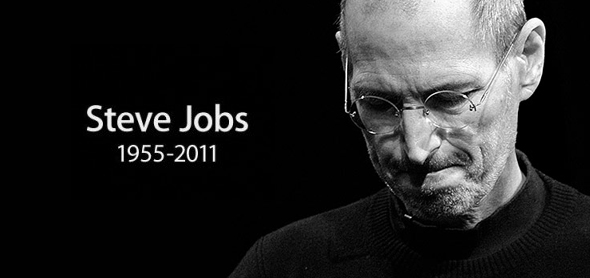
why do we care so much about the death of steve jobs?

at this point, it certainly isn’t breaking news that steve jobs passed away a couple days ago. the news came in torrents, particularly via social media. for a solid 24 hours, little else was talked about. even at the time of this writing, 2 of the top 10 trending topics on twitter are steve jobs-related.
the most interesting aspect of the deluge of tweets was how sincere the response was. there was a genuine expression of sadness and loss (myself included). when celebrities die, there is plenty of emotional response—particularly from musicians—because their art becomes woven into the very essence of our lives.
but steve jobs was a retired ceo.
of a tech company.
so why do people really care? undoubtedly, in 2011, at least a handful of CEOs of large, successful companies have passed away. but can we name them? no. and there’s been a handful of recognizable celebrities die in 2011 but they haven’t clogged social media streams like this. so why do we (particularly 20- and 30-somethings) care about steve jobs?
we care because we value beauty. we search for it. we are particular about it. we sense it and feel it. we are inspired by it. we need it.
and that is at the very core of steve jobs’ legacy at apple.
the united states’ success has been largely attributed to a dogged sense of pragmatism. we make and use things that just work. when you think of symbols of beauty in architecture or furniture or cars or practically any kind of manufactured product, you simply don’t think of the united states. but we do certainly have good, utilitarian products that just work.
and that tradition of pragmatism is precisely why younger generations have followed the evolution of apple in such a—dare i say—cult-like manner. when steve jobs challenged us to “think different”, we did because we were eager to leave behind an unchallenged paradigm where pragmatism and beauty couldn’t coexist. the divide didn’t make any sense to us. why sacrifice beauty when the two things could live harmoniously?
see, a dell computer or a droid phone (or insert-competitor-product) works (um, generally speaking), but the experience is, let’s say, less than inspiring. it’s bland and it’s busy and, most importantly, design is largely an afterthought (or executed in poor taste).
but with apple products, beauty is a feature. not an afterthought. but in harmony with the pragmatism of the computer or the phone or the mp3 player. it just worked. and it was just as beautiful. the experience was inspiring and beautiful and engaging.
steve jobs was a visionary and an innovator. and he deeply cared about the value of beauty that is held so preciously by younger generations.
in a world that is often grey and boring and full of the same, one company and one ceo forged a trail that united function and form in a previously unimagined way.
we care about the loss of steve jobs because he was a champion for beauty in an industry where it is overlooked and sidelined and treated as an impediment. he represented what we know could be the future, but isn’t yet. he personified a deep longing within us to see the mundane in new and fresh and beautiful ways.
so long, steve. you will be missed.












